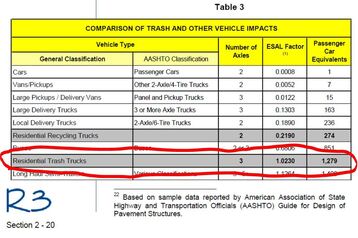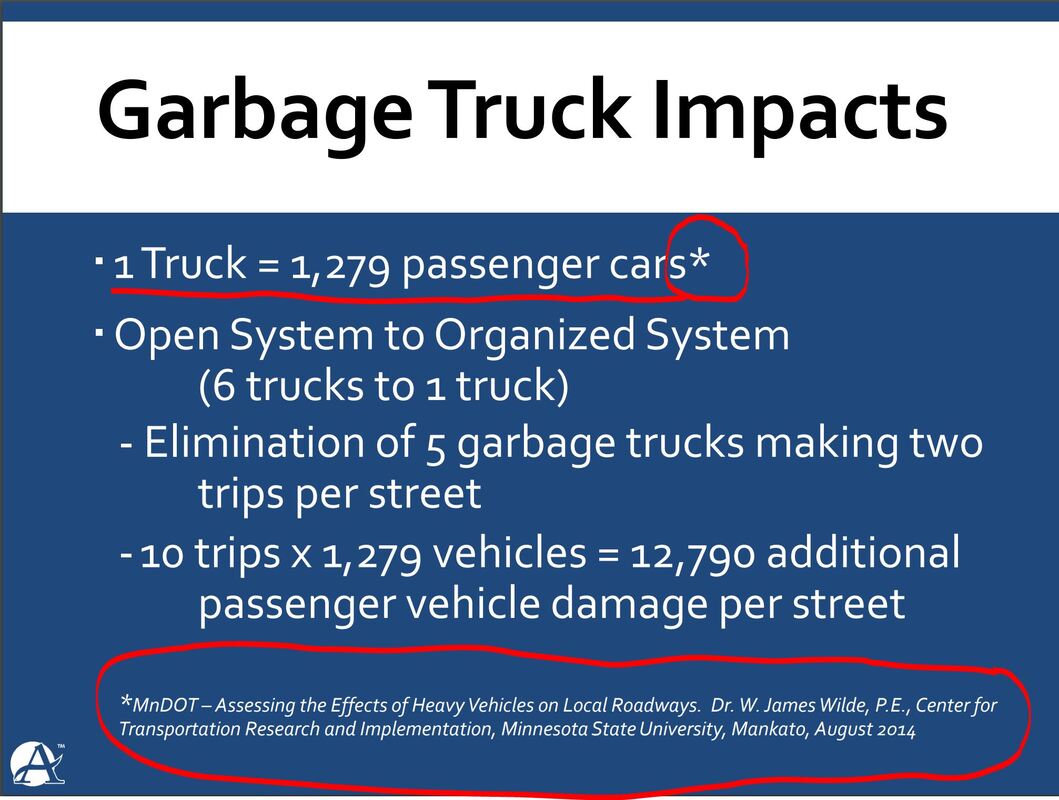City of Anoka
Fake News Claims About State Truck Weight Study
At the January 23, 2020 open house meeting, City manager Greg Lee showed a PowerPoint slide and proclaimed, "And taking a look at one study that was done by the University of Minnesota, it equates the damage that one garbage truck does as equal to nearly 1,300 passenger cars. And so one garbage truck equals basically 1,300 passenger vehicles. That’s quite a lot. In terms of damage to the street, that’s what one truck equals to."
Below is the slide City manager Greg Lee showed to residents at the open house. The redlining has been added to show City manager Greg Lee's connection of this 1,279 passenger car number to a report cited on the bottom of the slide.
Fake News Claims About State Truck Weight Study
At the January 23, 2020 open house meeting, City manager Greg Lee showed a PowerPoint slide and proclaimed, "And taking a look at one study that was done by the University of Minnesota, it equates the damage that one garbage truck does as equal to nearly 1,300 passenger cars. And so one garbage truck equals basically 1,300 passenger vehicles. That’s quite a lot. In terms of damage to the street, that’s what one truck equals to."
Below is the slide City manager Greg Lee showed to residents at the open house. The redlining has been added to show City manager Greg Lee's connection of this 1,279 passenger car number to a report cited on the bottom of the slide.
Certainly when City manager Greg Lee cites the "University of Minnesota", "MnDOT", and "Minnesota State University - Mankato", this gives the appearance that he speaks with authority on this 1 truck = 1,279 passenger car claim.
City manager Greg Lee even cites the author of the report by name, Dr. W. James Wilde, P.E.
This slide must be 100% fact, a statistic that cannot be questioned, and the key to institute Government Managed Trash Collection, right?
Too bad it is nothing more than fake.
The City of New Hope did not fall for this fake claim like City manager Greg Lee did.
A February 20, 2018 staff memorandum to New Hope City Manager Kirk McDonald states that staff personally spoke with Dr. Wilde, who was teaching in Texas at the time. (see 2/20/18 New Hope Memorandum, page 2)
Dr. Wilde stated, "about the question regarding 1 truck equivalent to 1,000 cars, I don't know where that one came from either..."
Let that sink in for a minute. The author of the report, Dr. Wilde, has no idea where this myth of 1 truck = 1,000 cars comes from, yet City manager Greg Lee is going around publicly claiming that this is some sort of irrefutable fact backed up by Dr. Wilde, two universities, and MnDOT.
City manager Greg Lee is simply not telling the truth.
City manager Greg Lee even cites the author of the report by name, Dr. W. James Wilde, P.E.
This slide must be 100% fact, a statistic that cannot be questioned, and the key to institute Government Managed Trash Collection, right?
Too bad it is nothing more than fake.
The City of New Hope did not fall for this fake claim like City manager Greg Lee did.
A February 20, 2018 staff memorandum to New Hope City Manager Kirk McDonald states that staff personally spoke with Dr. Wilde, who was teaching in Texas at the time. (see 2/20/18 New Hope Memorandum, page 2)
Dr. Wilde stated, "about the question regarding 1 truck equivalent to 1,000 cars, I don't know where that one came from either..."
Let that sink in for a minute. The author of the report, Dr. Wilde, has no idea where this myth of 1 truck = 1,000 cars comes from, yet City manager Greg Lee is going around publicly claiming that this is some sort of irrefutable fact backed up by Dr. Wilde, two universities, and MnDOT.
City manager Greg Lee is simply not telling the truth.
 Source of the 1 garbage truck = 1,279 vehicle myth - 2008 Fort Collins, Colorado - R3 Consulting Group Report
Source of the 1 garbage truck = 1,279 vehicle myth - 2008 Fort Collins, Colorado - R3 Consulting Group Report
Where did the 1 garbage truck = 1,000 cars myth come from?
Dr. Wilde further informs New Hope City Manager Kirk McDonald that this myth came from a report published by a company called Foth. (see 2/20/18 New Hope Memorandum, page 2)
Foth is a consulting firm that caters to government, makes a significant amount of money off of government contracts, and was cited by the State of Minnesota for violating the Minnesota Data Practices Act by hiding Minnesota public data on computers at their company headquarters in Green Bay, Wisconsin.
Where did Foth get this myth from? They got it from another consulting firm called the R3 Consulting Group, which is also referenced in Dr. Wilde's report.
Dr. Wilde's report "Assessing the Effects of Heavy Vehicles on Local Roadways", published August 2014, provides a summary of a completely different study from the R3 Consulting Group working for the City of Fort Collins, Colorado in 2008. This summary can be found on page 7 of the report. (See Assessing the Effects of Heavy Vehicles on Local Roadways)
On page 8, the summary of the R3 Consulting Group report makes it crystal clear that this is a study of roads not in Minnesota, but in the City of Fort Collins, Colorado!
On page 9, is the table which the myth of 1 garbage truck = 1,279 vehicles comes from. This R3 Fort Collins report is the real and original source!
City manager Greg Lee's claim that 1 garbage truck = 1,279 vehicles did not come from Dr. Wilde, did not come from the University of Minnesota, and did not come from Minnesota State University - Mankato.
City manager Greg Lee's claim actually comes from a 12 year old study done on road infrastructure in the City of Fort Collins, Colorado. Dr. Wilde makes it clear to the City of New Hope staff that he has no idea where they got that number from, and that they must use local road information and his formula.
If one is curious why the R3 Consulting Group believed 1 garbage truck equaled so many cars in Fort Collins, Colorado, it is most likely due to the fact that the Larimer County landfill and neighboring landfills had NO SCALE to weigh trucks that were tipping there. (See 2008 Fort Collins R3 Consulting Group report, EX-5 or page 13)
Haulers in Fort Collins, Colorado were not billed by weight. They could drive any truck of any weight to the landfill and they were charged by size of truck.
The system in Fort Collins, Colorado essentially provided an incentive to drive overweight trucks on city streets and then to the county landfill.
In Minnesota, disposal sites have scales, and overweight trucks are ticketed.
The 1 = 1,279 chart can also be found in the original 2008 Fort Collins R3 Consulting Group report in section 2-20 or page 46.
Updated 2/2/20
Dr. Wilde further informs New Hope City Manager Kirk McDonald that this myth came from a report published by a company called Foth. (see 2/20/18 New Hope Memorandum, page 2)
Foth is a consulting firm that caters to government, makes a significant amount of money off of government contracts, and was cited by the State of Minnesota for violating the Minnesota Data Practices Act by hiding Minnesota public data on computers at their company headquarters in Green Bay, Wisconsin.
Where did Foth get this myth from? They got it from another consulting firm called the R3 Consulting Group, which is also referenced in Dr. Wilde's report.
Dr. Wilde's report "Assessing the Effects of Heavy Vehicles on Local Roadways", published August 2014, provides a summary of a completely different study from the R3 Consulting Group working for the City of Fort Collins, Colorado in 2008. This summary can be found on page 7 of the report. (See Assessing the Effects of Heavy Vehicles on Local Roadways)
On page 8, the summary of the R3 Consulting Group report makes it crystal clear that this is a study of roads not in Minnesota, but in the City of Fort Collins, Colorado!
On page 9, is the table which the myth of 1 garbage truck = 1,279 vehicles comes from. This R3 Fort Collins report is the real and original source!
City manager Greg Lee's claim that 1 garbage truck = 1,279 vehicles did not come from Dr. Wilde, did not come from the University of Minnesota, and did not come from Minnesota State University - Mankato.
City manager Greg Lee's claim actually comes from a 12 year old study done on road infrastructure in the City of Fort Collins, Colorado. Dr. Wilde makes it clear to the City of New Hope staff that he has no idea where they got that number from, and that they must use local road information and his formula.
If one is curious why the R3 Consulting Group believed 1 garbage truck equaled so many cars in Fort Collins, Colorado, it is most likely due to the fact that the Larimer County landfill and neighboring landfills had NO SCALE to weigh trucks that were tipping there. (See 2008 Fort Collins R3 Consulting Group report, EX-5 or page 13)
Haulers in Fort Collins, Colorado were not billed by weight. They could drive any truck of any weight to the landfill and they were charged by size of truck.
The system in Fort Collins, Colorado essentially provided an incentive to drive overweight trucks on city streets and then to the county landfill.
In Minnesota, disposal sites have scales, and overweight trucks are ticketed.
The 1 = 1,279 chart can also be found in the original 2008 Fort Collins R3 Consulting Group report in section 2-20 or page 46.
Updated 2/2/20
